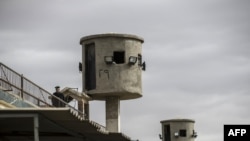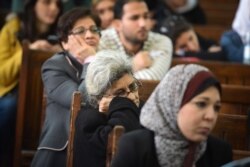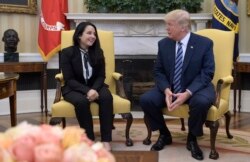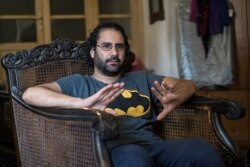Egyptian police released the 63-year-old mother of a jailed activist Thursday night after she and three other prominent Egyptian women staged a bold protest at the entrance to the Council of Ministers building, calling on authorities to free political prisoners vulnerable to coronavirus.
Fourteen additional people tested positive for COVID-19 in Egypt Wednesday, according to the Health Ministry in Cairo, bringing the total number of diagnosed cases in Egypt to 210, including six reported deaths.
Cairo University professor Laila Soueif was held at a downtown police station for 24 hours after petitioning the government to take concrete steps to protect the prison population from COVID-19.
Her son, Alaa Abdel Fattah, a 38-year-old blogger and software developer, has been jailed for the past six months at the maximum-security Tora B prison complex known for its cramped cells and inadequate sanitary facilities.
“The only way to prevent detention centers becoming hubs for spreading the pandemic and endangering the entire population of the country is to release as many prisoners as possible, and bring the numbers down to a minimum,” reads the petition by Ahdaf Soueif, a novelist and political writer; Mona Seif, an award-winning human rights activist and scientist; Rabab al-Mahdi, an American University in Cairo professor; and Laila Soueif.
The women said releasing detainees would facilitate disinfection procedures, allow prison officials to conduct routine examinations, and isolate suspected cases to effectively control the spread of the pandemic and limit its effects on those who become ill.
"The family braved this not only for the sake of Alaa but to pressure the state to take immediate measures to contain COVID in prisons,” Aya Hijazi, the Egyptian American aid worker imprisoned for nearly three years, said.
Hijazi was released in April 2017 after a personal intervention by President Donald Trump with Egypt’s leader, Abdel-Fattah el-Sissi.
"These women are courageous because even a benign Facebook post may land a person in prison,” Hijazi told VOA. “Any act of physical protest guarantees arrest. Beatings and abuse are frequent during the interrogation process, and trials are a sham.”
Alaa Abdel Fattah is one of tens of thousands of political prisoners who civil liberties groups say are jailed by a government that has increased incarceration of peaceful dissenters, including writers, students, artists and advocates for the rights of women and Christians in Egypt.
Many are held in jail for years without formal charges brought before the Egyptian court system.
Last January, el-Sissi told the American TV network CBS that “we don’t have political prisoners.”
These official denials mean that the numbers of those detained are estimates gathered by rights monitors and range between 20,000 and 60,000 individuals held on political charges since el- Sissi came to power in 2014.
Even before the COVID outbreak, U.N. experts already warned that “brutal prison conditions” placed the health and lives of thousands of prisoners at risk.
“We have received reports of overcrowding, inadequate food, poor ventilation and no access to sunlight. Prisoners are denied family visits and fail to receive necessary medical care. Many are placed in solitary confinement for extended periods,” said Agnes Callamard, special rapporteur for the U.N. Working Group on Arbitrary Detention.
Callamard submitted a report to the world body in November after the death of former President Mohamed Morsi, a leader of the now-outlawed Muslim Brotherhood.
The 67-year-old Morsi was jailed for five years at the Tora prison complex and died last June in a Cairo courtroom, just moments after addressing judges as he faced charges of espionage-related contacts with the Palestinian Islamist group Hamas.
Egyptian authorities launched another massive crackdown in September after a construction contractor's videos criticizing el-Sissi "went viral.”
Police in downtown Cairo arrested scattered groups of protesters and engaged in “social media checks” of citizens’ digital devices, rounding up more than 2,300 people.
Alaa Abdel Fattah was detained after the September protests, rearrested after having already served five years for organizing political protests without requesting official permits.
“Prisons and detention facilities are overcrowded with both convicted prisoners and pre-trial detainees held in cruel circumstances,” said Mina Thabet, a human rights researcher whose work focused on the Coptic Christian community before his arrest by Egyptian authorities in 2016.
“The toilets are holes in the floor, and people wash with the same shower hose used to remove human waste,” Thabet said, speaking with VOA from London.
“Increasing use of pretrial detention by Egyptian authorities as a tool to quash dissent means prisons have become overwhelmed, and this increases the risks of the spread of the pandemic,” said Thabet, now head of the policy unit at the Egyptian Commission for Rights and Freedoms.
The international watchdog group Human Rights Watch has also called on Cairo authorities to "spare disaster” with conditional releases, a move enacted by regional rival Iran, which temporarily freed about 85,000 prisoners earlier in the week.
“Thousands of individuals are currently being held in detention conditions which fall afoul of international standards," Theodora Christou, executive committee member of EuroMed Rights, said. ”This alarming situation is aggravated by the spread of COVID-19.”
“Social distancing is not a possibility for the women, men and children who already face conditions which have led to deteriorating health conditions, even before the advent of a global pandemic,” Christou said. “Egypt must follow other countries in releasing those in detention to reduce overcrowding before COVID-19 leads to many preventable deaths, starting by those arbitrarily arrested.”













